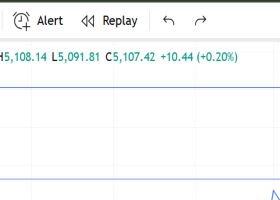🔗 How to Calculate True Risk When Trading Correlated Pairs
🎯 The Lesson
Most traders think each trade has its own risk.
But when pairs move together — EURUSD, GBPUSD, XAUUSD, NAS100 —
your “separate trades” become one big exposure to the same direction.
If you don’t calculate true correlated risk, a single move can wipe out half your account.
⚙️ Step 1: Understand Positive and Negative Correlation
Positive correlation → pairs move in the same direction.
Example:
-
EURUSD ↑
-
GBPUSD ↑
-
XAUUSD ↑
These are USD-weakness trades.
Open all three?
You’re basically opening three versions of the same trade.
Negative correlation → pairs move in opposite directions.
Example:
-
EURUSD ↑
-
USDJPY ↓
Both represent USD weakness — the direction is the same, but movement is opposite visually.
If you buy EURUSD and buy USDJPY together, you’re actually contradicting yourself.
📊 Step 2: Calculate Total Risk Across Correlated Pairs
If you risk 2% per trade and open:
-
EURUSD buy → 2%
-
GBPUSD buy → 2%
-
XAUUSD buy → 2%
True risk is not 2% per trade.
It’s:
👉 2% + 2% + 2% = 6% exposure to USD weakness
If USD strengthens unexpectedly, you will likely lose all 3 trades at once.
This is how accounts disappear without “doing anything wrong.”
🧮 Step 3: Use the Correlation Table Rule
Before opening multiple trades, check correlation:
| Pair Combination | Correlation | Risk Rule |
|---|---|---|
| EURUSD & GBPUSD | High + | Count as one trade |
| XAUUSD & GBPUSD | Med + | Risk × 1.5 |
| EURUSD & USDJPY | High – | Count as two trades |
| NAS100 & XAUUSD | Med – | Use half size |
If correlation is:
-
Above +0.75 → treat them as one trade
-
Between +0.50 and +0.75 → treat as 1.5× risk
-
Below +0.50 → independent
🔢 Step 4: Apply the “Max Exposure Rule”
Your total correlated exposure should never exceed:
👉 6% of your account
Example:
If EURUSD, GBPUSD, and AUDUSD all show USD weakness →
open only one or two trades total, not all three.
Professionals keep maximum correlated exposure under 4%–6% to avoid cluster losses.
💡 Step 5: Reduce Size, Not Opportunities
If you want to take multiple correlated trades, simply shrink position size.
Example:
Instead of:
-
3 trades × 2% risk = 6% total
Do: -
3 trades × 0.7% risk = 2.1% total
Same opportunity
→ lower danger
→ smoother equity curve
→ easier recovery
🚀 Takeaway
A trader with three correlated trades is not “diversifying.”
They’re multiplying risk without knowing it.
When you calculate true correlated exposure, you stop blowing accounts during trends you didn’t expect.
Control correlation — and you control your entire portfolio.
📢 Join my MQL5 channel for more trading & risk-management insights:
👉 https://www.mql5.com/en/channels/issam_kassas



